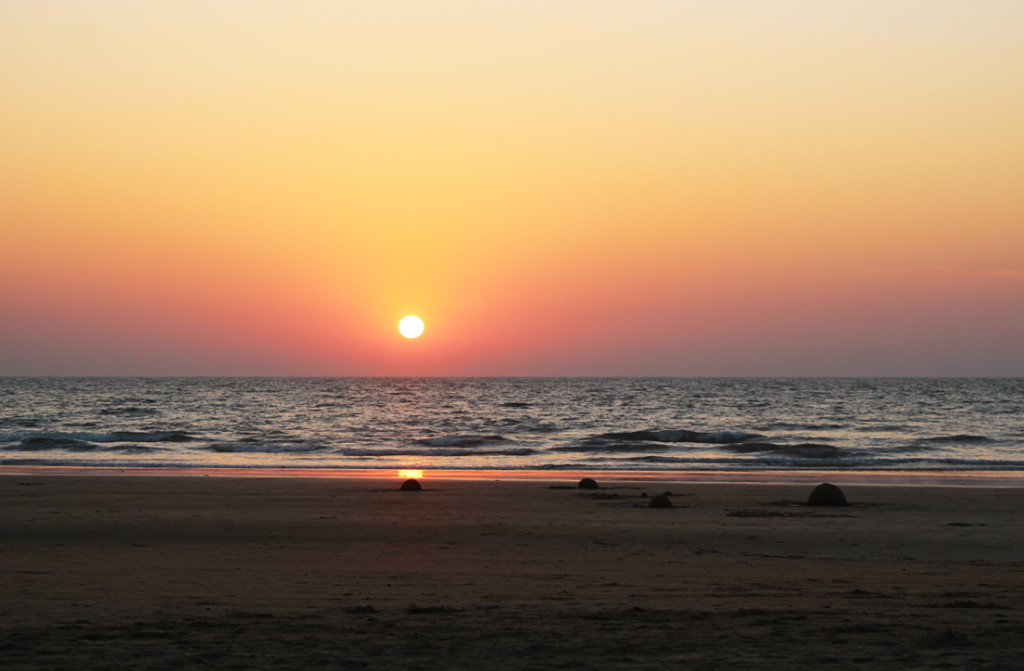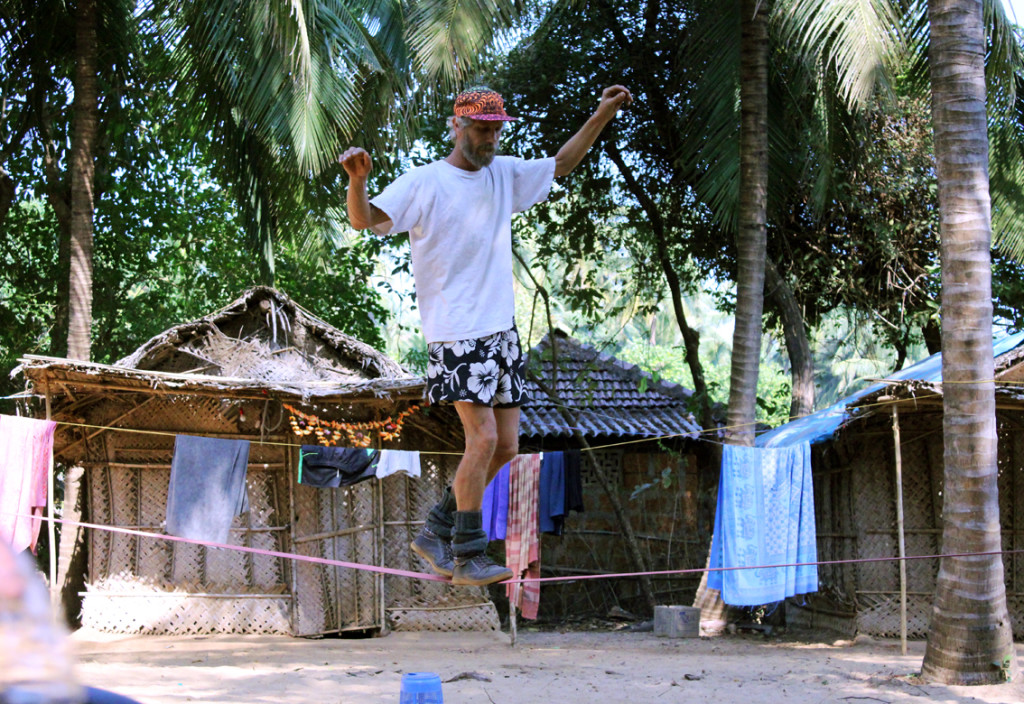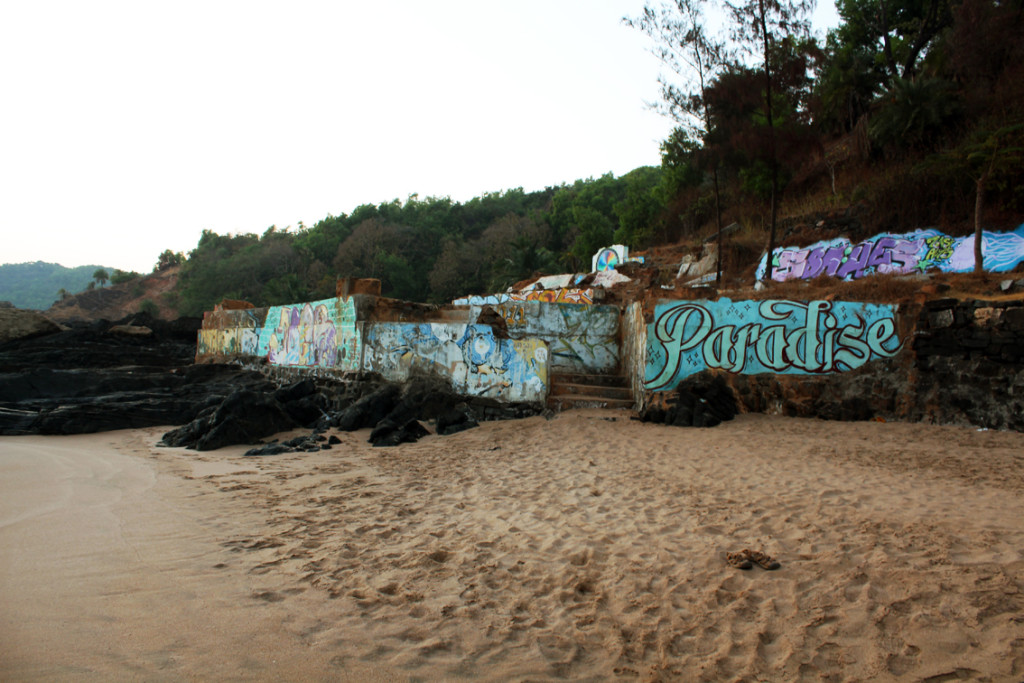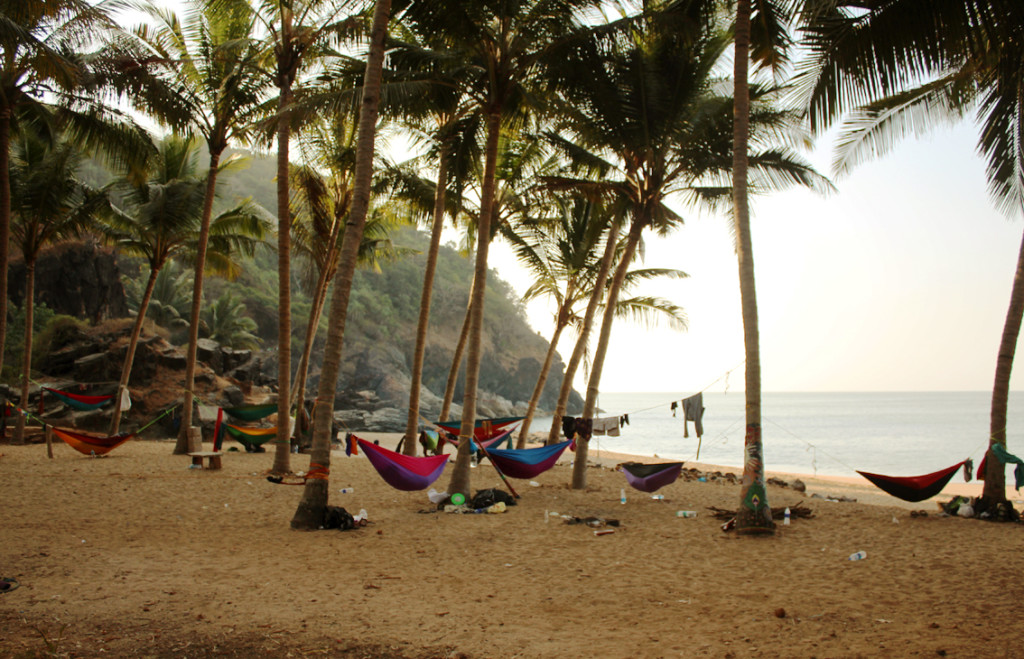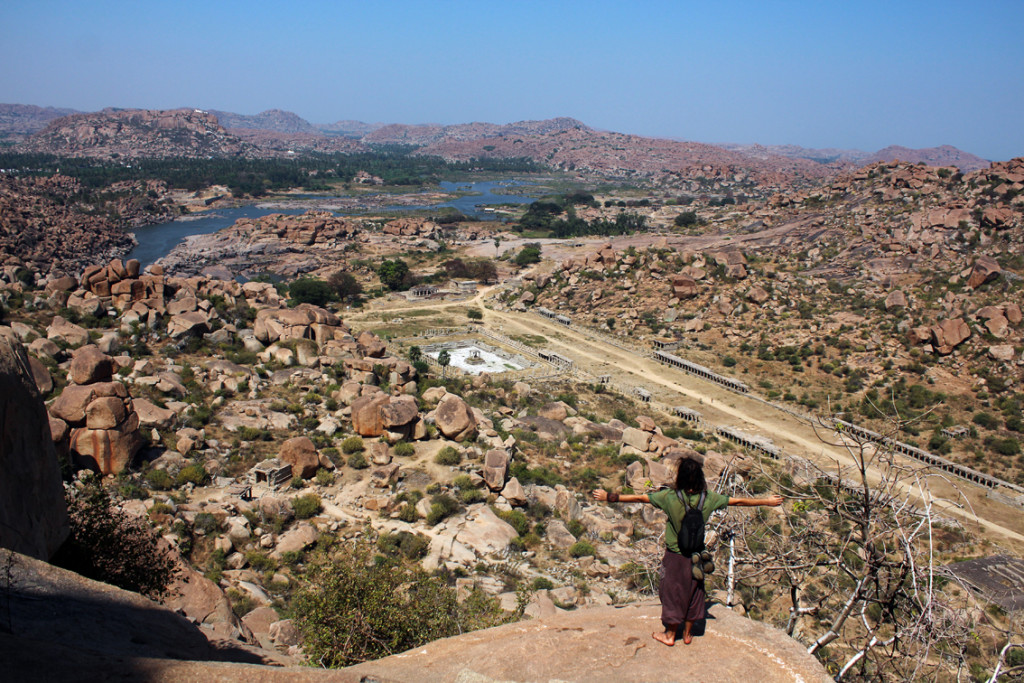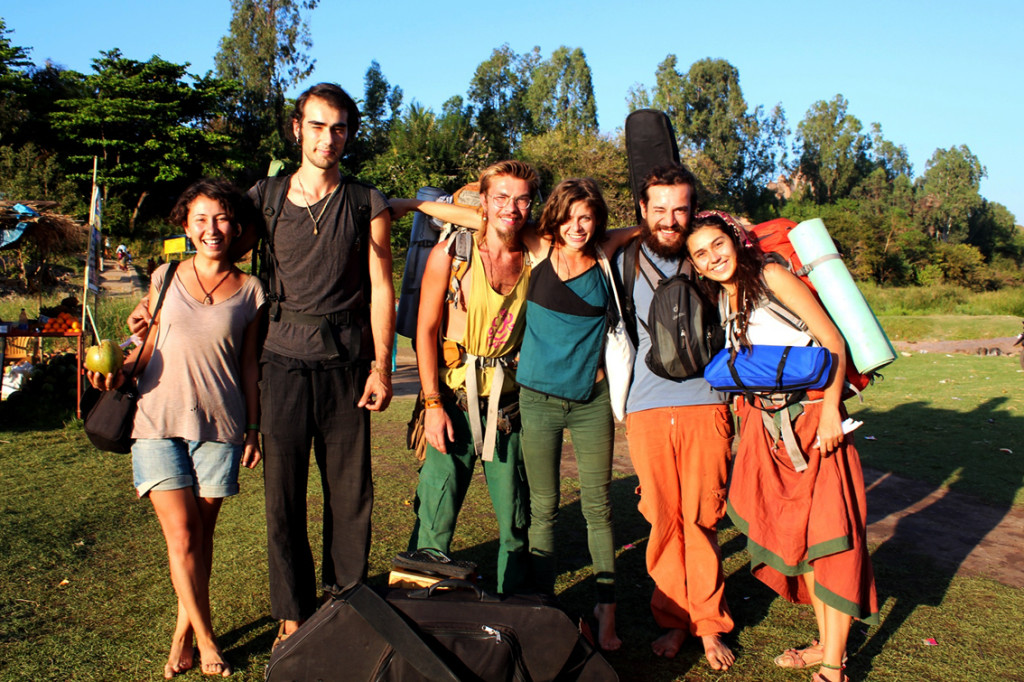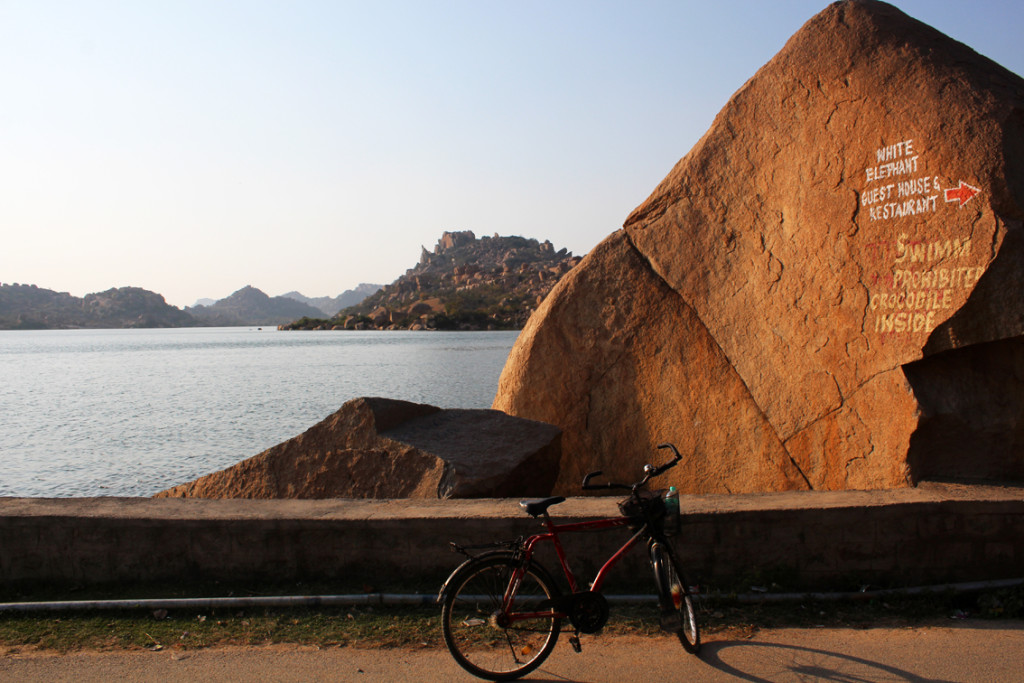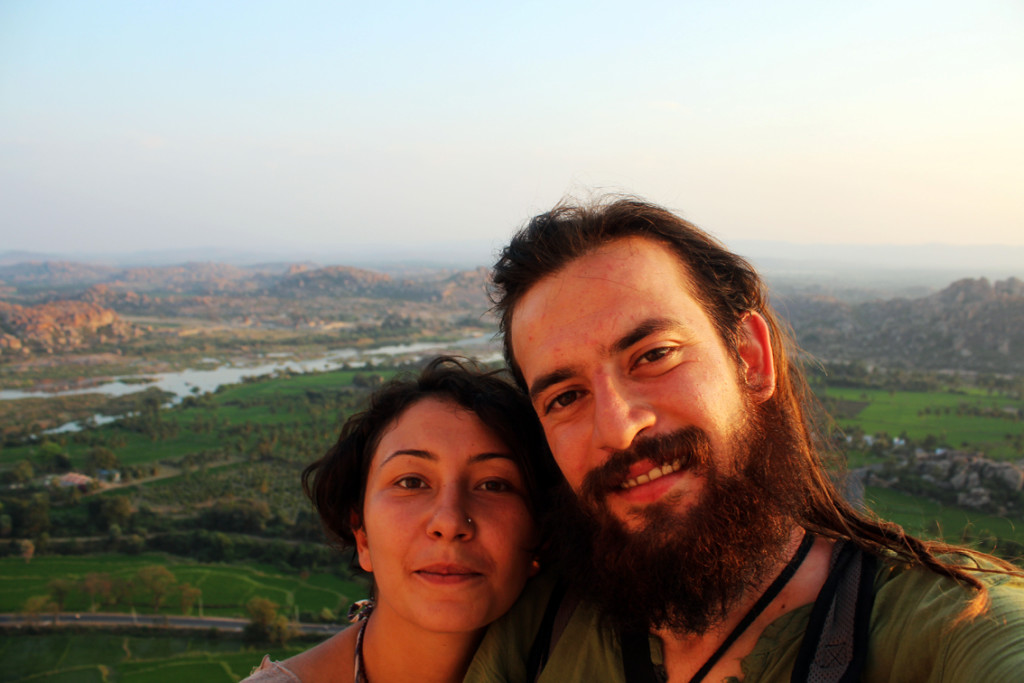In our long trip from the south of India to the north, we left Karnataka at the end of February, where we came at the end of January.
Gokarna, where we arrived after 16 hours of train journey starting from Mysore, is a settlement in Karnataka State of India, south of Goa. It is a place we just stopped by on the advices of travellers we met on the road. Keeping its small town view, Gokarna is a coastal settlement, in which, density of population is mostly consisted of tourists. We stay for 12 days in Kudle Beach unexpectedly, where you can reach by renting a tuk-tuk for 100 Rs (1,5 $) just from the bus stop or for free by walking for 20 minutes.
We walk down the hill, after getting off from the tuk-tuk that left us on a steep and arid hill. The road leads to the beach passing over the stair shaped rocks. The hot beach lies before us, on which to walk at noon, one should be either as fast as Roadrunner or as patient as a Buddhist monk. It is 29th of January and we are looking for a shadow where there is no danger of falling coconuts.
Along the coast, there are guesthouses after the long beach. Except several expensive places, most of the rooms are huts, walls of which are built by using coconut leafs with sand floor. But anyway, it is not easy to find a room in high season. We start looking for a place to camp, rather than paying 350-400 Rupees (7-10 $) for a room that doesn’t provide any comfort to us. We put our tent close to a river (do not imagine blue color water) that cannot reach the sea from the surface, under the trees that are not coconut trees.
Everybody gets together at the beach for the sunset. While the travellers are opening the counters to exhibit and sell their handiworks, people are gathering around different fires or candle lights and sing. An Israeli traveller plays his local song with his own instrument and someone else is following him with lyrics in Greek. The song comes out from our lips; “Üsküdar’a gider iken…”
We spent our time in Kudle Beach in a place where the community of travellers, formed by different people who were born and travelled in different places, coming together and living together like such problems as racism, sexism and nationalism has already been solved on earth long time ago.
On our third day, we move our tent into the garden of UK Guesthouse (UK is the acronym of a word in Hindi, not United Kingdom).
The open area in the middle of the rooms, built by organic material, is like the small square of a village with a kitchen on one side, which you provide nearly everything you need and slacklines between the trees. Everybody is close like already know each other. We spent 12 days in Kudle, listening to different road stories, trying to keep balance on a slack line, improving ourselves on macramé, making translations in the time left and watching the sunset every day.
Laughter Yoga that we joined in one our last days enacted vibrations, which we learned to observe in Vipassana.
Even Sezgin couldn’t find his sandals that he lost in our first day; we leave Kudle with Charlie Chaplin slippers given to us as a present by a Polish traveller.
But after a relation of 12 days, we cannot dare to go away and pass to Paradise Beach, where we reached after taking a bus from Gokarna for 10-15 minutes and after a walk for half an hour. It is also possible to reach there by following the trekking route following the coast for 1-2 hours, starting from Kudle Beach and passing through Om Beach and Half Moon Beach. Also you can hire one of the small boats from.
Paradise Beach is a small beach where the ruins of guesthouses and restaurants demolished by the state for protection stands, and the people stays in their hammocks or in a tent which they brought. There are two wells to take water for cleaning, but as we didn’t know either it is safe drink or not, we bought our drinking water from the seller coming to the beach every day. It is also possible to supply food by asking the same sellers the day before in advance. We prepared our breakfast every day and ate fruits like banana and pineapple for lunch. But spare the walk for Half Moon Beach for dinner, a nice way to spend our daily energy. At the end of the walking for 20-30 minutes, in which we pass over the hard soil and sand, slippy rocks and sharp stones, the shore and cliffs, we reach Half Moon Beach providing the opportunities of food and accommodation. Like in Kudle Beach, here also it’s possible to find food from traditional Indian dishes to Manchurian cuisine, from pasta to falafel and pizza. But of course, all are prepared by the same cook.
We present our hand wash system, which we made by the technique we learned in Sadhana Forest, to Paradise Beach and say goodbye to where we stayed for 3 days but felt home.
Our plan is to reach Hampi, where we would stay for a couple of days before moving to the north, but before, to buy a new adaptor for our computer and fix the problems of our telephone as much as we can. With this aim, we take a bus to Gokarna first, and then go to Karwar by another bus and buy the adaptor, then go to Hubli by and stay there in a hotel next to the coach station as it is already the evening. The following day, early in the morning we take a train and reach Hospet and decide to buy a new telephone as we find out that repairing our phone is not more logical than buying a new one.
Hospet is settlement with a train station, 15 kilometers away from Hampi. It is possible to reach Hampi from there by bus for 13 Rupees (15 cents). Tuk-tuk costs 150 Rupees (2,5 $). Before leaving the station, we buy our train ticket that will decide our staying and then go to Hampi to stay until 23th of February, the time for our train to Rajasthan.
The place we arrive is an ancient city, founded in a green valley shaped by a river flowing among the rock hills, look like they are shaped by the rocks falling from the sky. Passing through the settlement with shops divided by narrow streets called Market, and climb down the ancient stairs to take the boat to the other side of the river. 30 people fits in a small motor boat and pass the other side for 10 rupees (15 cents) per person.
While we were trying to find a place in one of the guesthouses next to the soil road on this side, we ran into one of our friends Gokarna and found Turkish travellers he met. İbrahim, Melih and Gökçe. They started travelling from Istanbul and reached India passing through Iran and Pakistan with their “heavy” instruments like santur and aqua. So, we spent their last days before they go to Thailand and our first days in Hampi together. We put our tent on the river side of the garden of a guesthouse there.
Hampi is very similar with Gokarna in means of its atmosphere. We meet with some people again, whom we met a couple of weeks ago. Sunset is amazing here also, with mountain scenery rather than the sea.
As there is no beach, people are coming together every day for sunset on the rocks called “sunset point”. A bicycle helps a lot to visit the surroundings. We rent two bicycles for 50 Rupees (80 cents) each and ride to Hanuman Temple, also called Monkey Temple. There are 600 steps to reach the temple with a nice view and friendly monkeys. One of these monkeys makes a “flee check” for Sezgin’s hair like it does to its relatives. On that side of the river, there is also a small waterfall and an artificial lake. You can safely swim in the lake without considering “Beware of Crocodiles” writings around.
On the Market side of the river, Shiva Temple stands at the top of a hill with 360 degrees Hampi view. Vitala Temple is also close, but we didn’t visit it as we are asked for 250 rupees (4 $). But there are plenty of temples around that you can visit for free.
As peace and quietness of Hampi captured us, we didn’t go to the train station at the time of our train to Rajasthan. We decided to stay a couple of days more in Hampi to buy a new ticket as we couldn’t cancel our ticket.
Actually, we were dreaming about spending one month of our travel in the north as Bijak (Seed Saver) in Navdanya Farm, with Earth University, founded by Vandana Shiva. But we learned that, we have to pay 1500 rupees (25 $) per person per day throughout our stay. We were disappointed as we couldn’t find another solution even we had stated that we could stay in our tent. When Barefoot College also asked for 1200 Rupees (20 $) just for a daily visit, we gave up and postponed our dreams for our visit to Nepal, where we are planning to go in spring.
We will be in Rajasthan for the Color Festival on 5th of March and welcome March in Northern India. Now, we have 40 hours train journey waiting for us…

